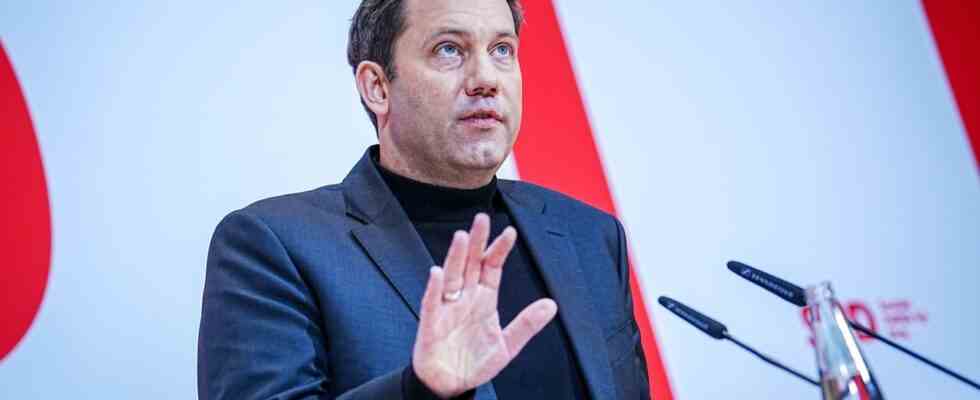Completely new sounds from the SPD!
And of all things from a Scholz loyalist: SPD co-boss Lars Klingbeil (44). With a new draft of German foreign policy, he is instigating nothing less than a revolution! And puts the Zauder Chancellor Olaf Scholz (64) under pressure. Klingbeil makes taboo words socially acceptable.
► Because: He wants nothing less than saying goodbye to the Holy Grail of the SPD, i.e. saying goodbye to the SPD’s traditional peace, disarmament and compensation policy – but above all to the Moscow policy (“change through trade”).
Since 1945, for example, the SPD has avoided the word “leadership” in foreign policy like the devil avoids holy water. Unthinkable: a leadership claim for Germany. The economic giant had to hide behind everyone. Just nothing big German – that sounds too much like big German.
Klingbeil is now clearing that up – radically at that.
► In the policy paper on foreign policy for which he is responsible (“Social Democratic Responses to a World in Upheaval”) it says: “As a social democracy, we want Germany to take the lead for a strong Europe, for peace, freedom and a rules-based international order.” Justified will be the one with Germany’s “size and economic strength”!
Under the heading “Take on a leadership role” the paper says, among other things: “We are an important partner for many countries around the world. And that is exactly why they expect Germany to show more initiative and take a leadership role on an international level.”
That means we can’t always stay out of it. If you are big and powerful like Germany, you have to use your power.
Klingbeil’s paper: a clear declaration of war on the head of the SPD parliamentary group Rolf Mützenich (63).
︎ He had only submitted his own draft for foreign policy at the beginning of January, which still smelled of the old SPD – and in which the word “leadership” only appeared as a synonym for the Russian government.
Mützenich wants to save the old SPD Ostpolitik for the modern age, but for Klingbeil it is nothing more than a valuable legacy – but only the foundation for a new, different path. Also in military questions, where Klingbeil clearly defines the ENFORCEMENT of one’s own interests as a political goal!
Klingbeil: “We are taking on more responsibility for enforcing our common interests in terms of a value-based peace order. This also includes leadership on an equal footing in military matters.”
Mützenich wants to know (almost) nothing about the “Bundeswehr”.
In Mützenich’s parliamentary group paper, the Bundeswehr is only dealt with under disarmament and arms control. The parliamentary army only occurs twice in 436 lines in the head of the parliamentary group.
Quite different with Klingbeil, who even calls for a military EU headquarters. Europe must “be able to defend itself conventionally against attacks” and have “corresponding deterrence capabilities”. One chapter is entitled “Strong partner in NATO”.
That sounds like a lot – just not like Easter marches, Egon Bahr and parliamentary group leader Mützenich, who still heavily relied on Russia in his paper:
Even if, for understandable reasons, there is no longer any trust in the current Russian leadership, writes the Mützenich parliamentary group, “diplomatic talks must remain possible”. Scholz’s phone calls with Russia’s ruler Putin were expressly described as correct.
► At Klingbeil: No trace of it! Russia is a threat, a nation at war – and an explicit aggressor against us too.
Unlike the faction leader, the party leader does not rely on Russia policy – but expressly on close coordination with Eastern Europe. According to Klingbeil, “the security interests of Eastern and Central Europe must be taken seriously”. So far, this has been neglected when looking at Moscow.
Klingbeil deliberately places Germany’s eastern neighbors at the center of German foreign policy, mentions “Eastern Europe” eleven times in the paper, and even devotes a separate chapter to the region.
► For comparison: In the case of Mützenich, the state region between Germany and Russia only occurs twice and is marginal. You have to “involve them more”.
It is now exciting who the chancellor is following in foreign policy: his young party leader or the old faction boss.

